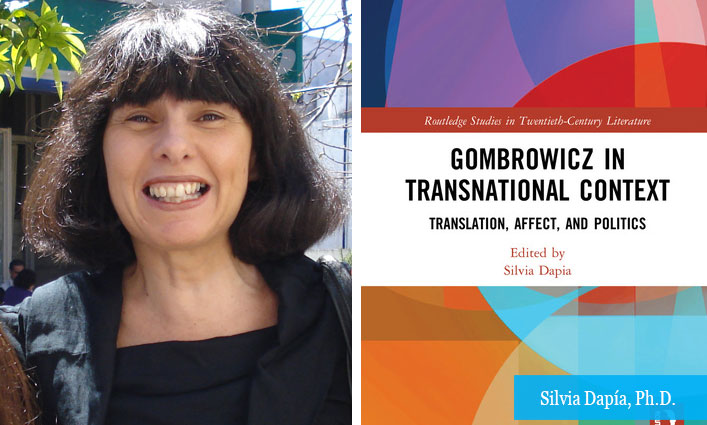
Silvia Dapía, Ph.D., Professor of Modern Languages and Literature, was awarded the 2021 Anna M. Cienciala Award by the Polish Institute of Arts and Sciences of America (PIASA) for best-edited book in Polish Studies. The volume of work, Gombrowicz in Transnational Context: Translation, Affect, and Politics, features various prominent scholars and focuses on the body of literature written by Witold Gombrowicz, a Polish-born novelist, playwright, and author. “While Gombrowicz is a well-known figure in Polish, French, and Argentinian literature, his work deserves wider recognition in the English-speaking world,” says Dapía. “I aimed to bring together scholars that belong not only to different countries but different academic departments as well to guarantee new perspectives on Gombrowicz. Winning this award is especially meaningful to me because the development of this volume owes much to PIASA.” Dapía shared with us her journey to John Jay, why this work is important to her, and her plans for the future.
“I aimed to bring together scholars that belong not only to different countries but different academic departments as well to guarantee new perspectives on Gombrowicz.” —Silvia Dapía
Can you tell us about your work at John Jay? Why was John Jay the right institution for you?
When I came to John Jay in 2010 as a professor and Chair of the Department of Modern Languages and Literatures, the department offered no credentials in Spanish. My expertise is in Latin American literature and culture, and German literature and culture. John Jay serves one of the largest Hispanic student populations of any four-year college in the northeast, so as Chair I set about creating a Spanish language major. I also created a minor in Spanish that students can take to meet their general education requirements and certificate programs in legal translation and interpretation. Currently, I teach courses for our Spanish major, General Education, and for the Ph.D. Program at CUNY’s Graduate Center. John Jay College was, and still is, the right institution for me because it allows me to contribute to the visibility of the unique role modern languages play within the liberal arts curriculum of a college dedicated to educating for justice.
“John Jay College was, and still is, the right institution for me because it allows me to contribute to the visibility of the unique role modern languages play within the liberal arts curriculum of a college dedicated to educating for justice.”—Silvia Dapía
Can you give us a deeper understanding of your work on Gombrowicz in Transnational Context: Translation, Affect, and Politics? Why were you compelled to edit this book?
In 1939, Gombrowicz accepted an invitation to take part in the maiden voyage of the Polish transatlantic liner Chrobry to Buenos Aires during the year that Germany invaded Poland. He ended up staying there for 23 years, but those first years in Buenos Aires were not easy. He did not know Spanish and had neither money nor friends, however, while there, he wrote his play Marriage, most of Diary, and three novels, Trans-Atlantyk, Pornography, and began Cosmos. Eventually, with a group of Cuban and Argentinean writer friends, he translated his prewar novel Ferdydurke into Spanish.
Gombrowicz in Transnational Context: Translation, Affect, and Politics studies Gombrowicz’s work in connection to translation and its impact. Moreover, to better understand these aspects of his work we place him in a political context. The book is divided into three sections: translation, affect, and politics. It was compelling for me to put together a volume that allowed readers to hear a wide variety of voices, which includes cultural and literary theorists and specialists in Slavic and Latin American literature, as well as Jerzy Jarzębski, the very best living scholar of Gombrowicz in the world.
Can you tell us more about the Anna M. Cienciala Award?
The Anna M. Cienciala Award was established to recognize the importance of collaborative scholarship and to honor Anna Cienciala’s long career and accomplishments in Polish studies. I organized two sessions on Gombrowicz for the Fifth World Congress on Polish Studies that PIASA sponsored in Warsaw in 2014 which introduced me to many of the scholars who later contributed to my edited volume.



